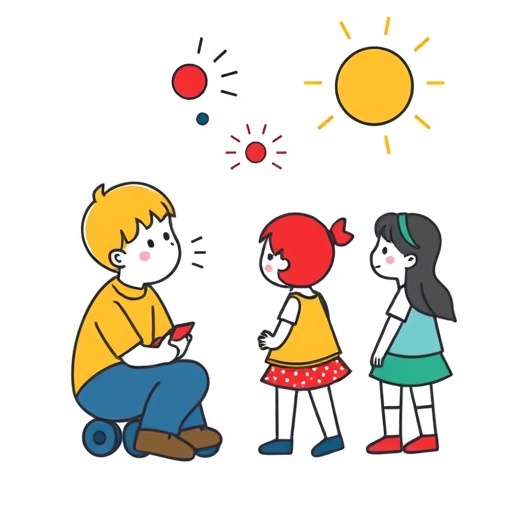In the evolving landscape of early childhood education, the phenomenon of expulsion from community childcare centers represents a significant challenge that merits exploration and urgency. A recent study by Giordano, Oh, Stolovitz, and colleagues sheds light on the predictors and patterns of this troubling occurrence over time, revealing critical insights that could inform policy changes and childcare practices.
The experience of expulsion from childcare settings not only disrupts the developmental trajectory of young children but also reflects broader societal issues. Many children who face expulsion come from marginalized backgrounds, underscoring the inequalities that persist within the education system. This research meticulously dissects the factors contributing to expulsion, ranging from behavioral challenges to socio-economic status, providing a comprehensive understanding of the context in which these decisions are made.
Central to the study is the identification of specific predictors of expulsion. The authors argue that understanding these predictors can aid educators and policymakers in developing early interventions. For instance, patterns identified suggest a correlation between certain behavioral traits in children and the likelihood of expulsion. Addressing these traits with support programs could significantly reduce the number of expulsions, thereby fostering a more inclusive environment for all children.
Furthermore, the research delves into the psychological and emotional ramifications of expulsion on children and families. The study highlights that children who are expelled may experience feelings of rejection and stigma, which can adversely affect their self-esteem and social skills. These ramifications extend beyond the individual child, impacting families and communities by perpetuating cycles of disconnection and disadvantage.
An essential aspect of the research is its longitudinal approach. By analyzing data over various timeframes, the study provides unique insights into how expulsion patterns evolve. This temporal analysis allows for a nuanced understanding of how interventions and systemic changes can alter the landscape of childcare expulsion, advocating for continued monitoring and adjustment of practices based on empirical evidence.
Parental involvement also plays a pivotal role in this discourse. The findings suggest that when parents are actively engaged in their children’s education and support networks, the likelihood of expulsion decreases. This underscores the necessity for childcare providers to foster strong partnerships with families, offering resources and communication avenues that empower parents in navigating challenges.
Moreover, the role of childcare staff training is underscored in the study. Educators must be equipped with the skills to understand and address behavioral issues effectively. Professional development programs that focus on positive behavior support and conflict resolution can prepare staff to manage challenging situations better, significantly reducing instances of expulsion.
Equally important is the research’s implications for policy. The authors call for urgent action from policymakers to establish frameworks that prevent unnecessary expulsions. This could include legislative measures that outline the conditions under which expulsion can occur and mandates for support interventions prior to the expulsion decision-making process. Proactive policy approaches could transform childcare systems into more inclusive establishments that prioritize child development over punitive measures.
The study also emphasizes the importance of targeted support services. Children who exhibit challenging behaviors often require tailored interventions that address their unique needs. Implementing access to mental health resources and individualized support plans within childcare settings is vital. This proactive stance creates a nurturing environment where children can thrive, reducing the likelihood of expulsion.
While the research paints a stark picture of expulsion rates and their implications, it also offers a glimmer of hope. By employing evidence-based strategies and fostering an inclusive ethos, childcare centers can turn the tide on this issue. The collaborative efforts of educators, parents, and policymakers can lead to transformative changes that ultimately benefit children and the community at large.
As society grapples with the complexities of early childhood education, this research serves as a clarion call for introspection and action. The stakes are high; expulsion from community childcare is not just an institutional failure, but a societal one with far-reaching implications. To cultivate a future where all children can flourish, it is imperative to heed the findings of this study and implement meaningful change in childcare practices and policies.
This extensive examination of the predictors and patterns surrounding expulsion from community childcare highlights an urgent societal challenge that warrants attention and action. Engaging stakeholders at every level will be crucial in addressing this issue holistically and ensuring that all children have the opportunity to thrive in supportive and nurturing environments.
By fostering a comprehensive understanding of the factors leading to expulsion, and committing to proactive measures, we step closer to dismantling the barriers that hinder children’s access to quality education. The commitment to constructive change must be unwavering, as every child deserves a chance to learn, grow, and succeed in their early developmental years.
In conclusion, the findings from Giordano, Oh, Stolovitz, et al. establish a vital framework for understanding and addressing expulsion from community childcare. The implications extend beyond individual cases, resonating with the broader themes of equity, inclusivity, and the shared responsibility we hold as a society for our children’s futures. It is a pressing reminder that in the fight against educational inequities, every voice and action can make a transformative difference.
Subject of Research: Expulsion from Community Childcare
Article Title: Expulsion from Community Childcare: Predictors and Patterns Across Time
Article References:
Giordano, K., Oh, Y., Stolovitz, R. et al. Expulsion from Community Childcare: Predictors and Patterns Across Time.
Early Childhood Educ J (2025). https://doi.org/10.1007/s10643-025-01933-8
Image Credits: AI Generated
DOI: 10.1007/s10643-025-01933-8
Keywords: Childcare expulsion, Early childhood education, Predictors, Behavioral challenges, Policy implications




